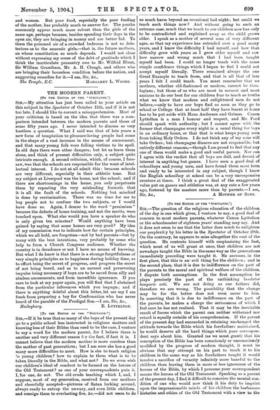Stn,—My attention has just been called to your article on
this subject in the Spectator of October 15th, and if it is not too late, I should like to correct a misapprehension. Most of your criticism is based on the idea that there was a com- parison intended between the modern parents and those of some fifty years ago. I never intended to discuss so very bootless a question. What I said was that of late years a new form of temptation to pleasure-loving people had come in the shape of a vast increase in the means of amusement, and that many young folk were falling victims to its spell. In old days there were other dangers; but let us leave them alone, and think of present difficulties only, a subject quite intricate enough. A second criticism, which, of course, I fore- saw, was that the schools are responsible for the want of intel- lectual interest. I do not at all admit this : because schools are very different, especially in their athletic tone. But my subject at Liverpool was the home, not the school; and if there are shortcomings in the home, you only perpetuate them by repeating the very misleading formula that it is all the fault of the schools. Nothing but mischief is done by recrimination. There was no time for me to beg people not to confuse the two subjects, or I would have done so. Again, I demur to the word " pessimism " because the defects of home training, and not the merits, were touched upon. What else would you have a speaker do who is only given ten minutes? Would anything have been gained by saying that some homes are very good? My idea of my commission was to indicate how far certain principles, which we all hold, are forgotten—not by bad parents—but by many with the best intentions, very probably by some who help to form a Church Congress audience. Whether the country is in decadence or not I have no means of knowing. But what I do know is that there is a strange forgetfulness of very simple principles as to happiness during holiday time, as to effort being the secret of progress, and progress the secret of not being bored, and as to an earnest and persevering impulse being necessary if boys are to be saved from silly and aimless amusements, and from incredible ignorance. If you care to look at my paper again, you will find that I abstained from the particular inferences which you impugn ; and if there is anything doleful about this letter, let me say I am fresh from preparing a boy for Confirmation who has never heard of the parable of the Prodigal Son.—I am, Sir, &c., Haileybury. E. LYTTELTON.
[To THE EDITOR OF THE " SPECTATOR."


























































 Previous page
Previous page